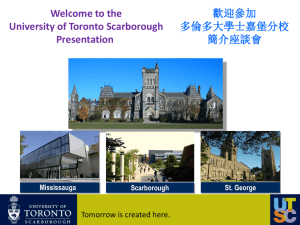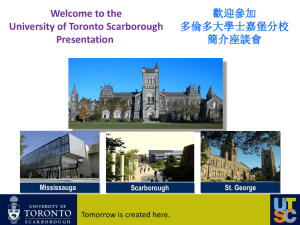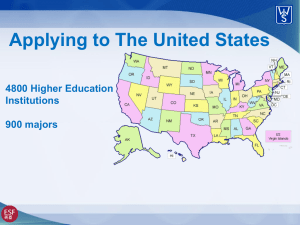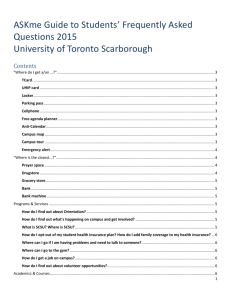Environmental Science - University of Toronto Scarborough
advertisement
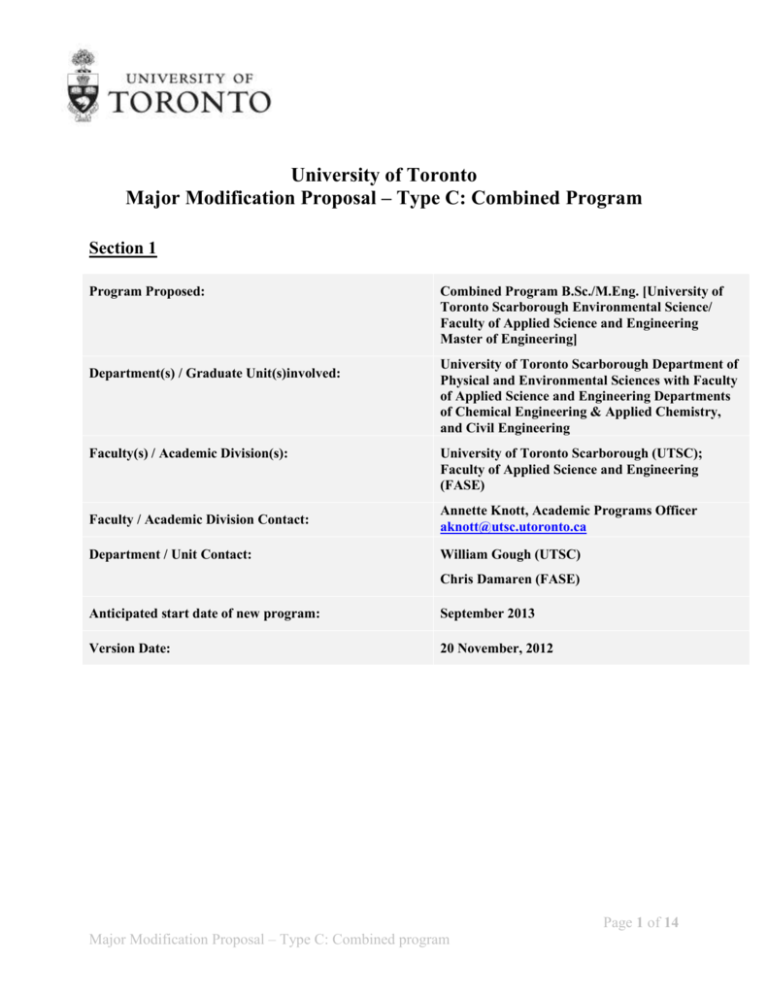
University of Toronto Major Modification Proposal – Type C: Combined Program Section 1 Program Proposed: Department(s) / Graduate Unit(s)involved: Faculty(s) / Academic Division(s): Combined Program B.Sc./M.Eng. [University of Toronto Scarborough Environmental Science/ Faculty of Applied Science and Engineering Master of Engineering] University of Toronto Scarborough Department of Physical and Environmental Sciences with Faculty of Applied Science and Engineering Departments of Chemical Engineering & Applied Chemistry, and Civil Engineering University of Toronto Scarborough (UTSC); Faculty of Applied Science and Engineering (FASE) Faculty / Academic Division Contact: Annette Knott, Academic Programs Officer aknott@utsc.utoronto.ca Department / Unit Contact: William Gough (UTSC) Chris Damaren (FASE) Anticipated start date of new program: September 2013 Version Date: 20 November, 2012 Page 1 of 14 Major Modification Proposal – Type C: Combined program Section 2 1. Executive Summary The Environmental Science Specialist and Major programs (including a Co-op option), offered through the Department of Physical and Environmental Sciences at the University of Toronto Scarborough (UTSC), have experienced steady growth over the past 20 years. In that time, the Specialist program has evolved into four separate programs (Environmental Biology, Environmental Chemistry, Environmental Geoscience, and Environmental Physics) and a Minor program in Environmental Science has been added. Recently, the Specialist and Major undergraduate programs were accredited by the Environmental Careers Organization (ECO). In addition, at the graduate level, a highly successful professional Master’s program was launched in 2006 (http://www.utsc.utoronto.ca/~physsci/menvsci/), followed by an equally successful Ph.D. in 2010 (http://www.utsc.utoronto.ca/~physsci/phd/). As part of its efforts to actively seek out new ways to expand its offerings, and deepen the educational experience of its students, UTSC has been in discussions with the Faculty of Applied Science and Engineering (FASE) to explore possible areas of collaboration. Environmental Science has been identified as one such area, as many graduates of the UTSC Environmental Science programs have expressed an interest in the expertise that an Engineering program can provide. This is especially true for those desiring to work in the environmental consulting industry. UTSC and FASE are in agreement that a combined program between the UTSC Environmental Science Specialist programs (B.Sc.) (http://www.utsc.utoronto.ca/~physsci/environ_sci ) and the Master of Engineering (M.Eng.) offered by FASE (http://www.engineering.utoronto.ca/Future_Students/Graduate_Studies/gradprograms/Master_of _Engineering.htm) is an ideal area for collaboration, and are consequently proposing a Combined program that allows students to complete a Bachelor of Science (B.Sc.) in any one of the four Specialist programs in Environmental Science identified above, and a Master of Engineering (M.Eng). The appeal of this program is twofold: it allows students to apply early to the Master of Engineering program (in the third year of the B.Sc.), and it allows them to complete the Combined program in less time than is normally the case for an M.Eng. that follows upon a bachelor’s degree. It should be noted that completion of the proposed Combined program will not provide a path to licensure as a professional engineer (this requires completion of an accredited undergraduate degree in engineering). The FASE program is a professional Master’s program. The combination of this program with the B.Sc. in Environmental Science is ideal for students looking to work in the environmental consulting industry. It also provides a rich intellectual pathway for exceptional undergraduate students by providing access to graduate courses and a graduate milieu before the completion of an undergraduate degree. Students participating in the Combined program will have the option of pursuing the M.Eng. program in either the Department of Chemical Engineering & Applied Chemistry, or Civil Engineering. Providing the option of a Combined program with Engineering will enhance the attractiveness of Page 2 of 14 Major Modification Proposal – Type C: Combined program UTSC’s Specialist undergraduate programs in Environmental Science thus yielding more and better applicants, both domestic and international. At present UTSC enrols just under 100 Environmental Science Specialist students and has the capacity to double this number. The combined program will provide an excellent stream of students with a well-defined environmental educational background to the M.Eng. program. This will enhance the environmental offerings at the University of Toronto by providing an academic pathway for very strong students. The increase in the number of M.Eng. students is consistent with FASE’s desire to expand M.Eng. enrolments with excellent students. Environmental studies are an important element of the graduate programs in Chemical Engineering & Applied Chemistry and Civil Engineering, and the academic environment will be improved by the diverse backgrounds that the B.Sc. students bring to the classroom. The B.Sc. in Environmental Science includes fundamental courses in science and mathematics. This will be bolstered by the requirement that participants complete two undergraduate engineering courses as part of their B.Sc. degree requirements. This will ensure that participants have the proper background for completing the M.Eng. program. Students will apply to the combined program during the Fall term of the third year of the B.Sc. program. Offers of admission will be conditional on maintaining at least a B+ average in the third and fourth years of study. During the conditional admission period (until the undergraduate degree is complete) students will be required to take two undergraduate engineering courses which can be used to meet the degree requirements of the B.Sc. These courses will be identified by the relevant FASE department (either Chemical Engineering & Applied Chemistry, or Civil Engineering). Students in the Combined program who have accepted conditional offers of admission to the M.Eng. program will be eligible to take two half courses from the Master’s courses that will count towards both degrees. Students will be graded as graduate students in those courses and will require a passing grade (graduate course standard). 2. Program Rationale Both the University of Toronto Scarborough (UTSC) and the Faculty of Applied Science and Engineering (FASE) wish to grow in the environmental field - a burgeoning academic focus for both intellectual pursuit and occupational demand – and are consequently proposing to combine two excellent existing programs to the benefit of both units. The combination of the four undergraduate Specialist programs in Environmental Science (Environmental Biology, Environmental Chemistry, Environmental Geoscience, and Environmental Physics) at UTSC, and the graduate Master of Engineering (M.Eng.) program at FASE will produce a well educated and trained environmental professional able to meet the developing environmental needs of our society. The Combined program will be five years in length (4+1). Providing this Combined program will enhance the attractiveness of the UTSC undergraduate programs in Environmental Science thus yielding more and better undergraduate applicants, both domestic and international. It will also provide an excellent stream of students with a wellPage 3 of 14 Major Modification Proposal – Type C: Combined program defined environmental educational background to the M.Eng. program. The UTSC undergraduate program will gain by having a well-defined pathway into the exceptionally well-regarded Engineering programs offered by FASE. In turn FASE will have a novel stream of students well prepared in the foundations of environmental science, and in the cutting edge issues of this emerging discipline. They will bring a perspective to their courses that is different from their engineering counterparts. The Specialist undergraduate programs in Environmental Science currently enrol almost 100 students and there is capacity for this to grow by 50 – 100%. The new combined program is consistent with FASE’s desire to increase M.Eng. eligible full-time equivalents (EFTEs) by 15% (approximately 50 students) by 2015. Other universities do offer combined programs, particularly Faculties of Engineering (eg. Waterloo), however we understand this particular combination of Environmental Science and Engineering to be unique in Canada. 3. Need and Demand The UTSC Department of Physical and Environmental Science has discussed this proposal with the current undergraduates in the Environmental Science Specialist programs and keen interest was expressed. Co-op employers involved with the UTSC programs have also expressed an interest in graduates with these dual credentials. It is anticipated that a steady stream of 5 to 10 students per year will avail themselves of this opportunity. UTSC recruiters comment frequently on the cache of “Engineering” in their visits to high schools. This is also true for the Green Path (a UTSC international recruit program) recruiters. Linking one of the UTSC undergraduate programs to an Engineering program will increase enrolment in undergraduate environmental science programs. These are excellent programs (ECO accredited) and UTSC has the capacity to add more high quality students to the program. The combination of the undergraduate program in Environmental Science and the graduate program in Engineering will produce a well educated and trained environmental professional who will meet the developing environmental needs of our society. Graduates of the combined program will possess a combination of pure and applied science that gives them a unique perspective on environmental issues. Table 1: Enrolment Projections Year in program Total: Academic year #1 2013/14 Academic year #2 2014-15 Academic year #3 2015-16 10 Academic year #4 2016-17 10 Academic year#5 2017-18 10 10 10 10 The table shows enrolment in the M.Eng. component of the combined program. Page 4 of 14 Major Modification Proposal – Type C: Combined program 4. Program Description The current requirements of both programs will be met by the students in the Combined program. Two prescribed undergraduate half courses (1.0 FCE) offered by FASE must be counted to the degree requirements (but not program requirements) of the B.Sc. Up to two graduate courses (1.0 FCE) offered by FASE of the 5.0 FCEs required for the M.Eng. may be completed during the student’s fourth year and will count towards both degrees. For the B.Sc., a total of 20 FCEs are required. The 1.0 graduate FCE will not count towards the 14.5-15.5 (program dependent) FCEs for the program but may be counted towards the remaining 4.5-5.5 FCEs required for the degree. The normal time for completion will be five years (4+1). For proposed UTSC Calendar description – showing changes, see Appendix A For proposed Chemical Engineering and Applied Chemistry Calendar description – showing changes, see attached For proposed Civil Engineering Calendar description – showing changes, see attached 5. Admission Requirements The admission requirements for the Environmental Science B.Sc. remain identical to the existing programs. [See UTSC Calendar: http://www.utsc.utoronto.ca/~registrar/calendars/calendar/Environmental_Science.html]. Students will apply in year three for expedited admission into the Master of Engineering program. Students must meet the admission requirements for the Master of Engineering program and must have an average of B+ in the last two years of undergraduate study. This exceeds the SGS minimum of a mid-B. Students will be required to maintain at least a B+ average in year three and year four to remain in the Combined program. After admission, students will be eligible to take up to two half courses in the Master’s curriculum while in the B.Sc. program (during year four). These courses can be counted to fulfill degree requirements for the B.Sc. and to fulfill degree and program requirements for the Master’s degree. 6. Program Requirements Program Description The Combined program in Environmental Science (B.Sc.) and M.Eng. allows exceptional students (registered in one of the 4 specialist programs in Environmental Biology, Environmental Chemistry, Environmental Geoscience, or Environmental Physics) to apply for and be considered for admission to the M.Eng. program in Chemical Engineering & Applied Chemistry or Civil Engineering. It provides expedited admission into the M.Eng. during year three. Admitted students must complete two prescribed engineering half courses (1.0 FCE) as part of the B.Sc. degree requirements. For admitted students, up to 1.0 FCE of the required Master’s course can be taken during year four and count toward the B.Sc. degree requirements and the Page 5 of 14 Major Modification Proposal – Type C: Combined program Master’s program and degree requirements. This permits students to complete the two programs in slightly less time than would normally be possible. Minimum Admission Requirements A call for applications for the Combined program will occur in September of the third year of full-time study in the B.Sc. program. A Combined program admission committee with representation from both UTSC and FASE will vet the applications and recommend offers of admission. To be eligible for admission into the M.Eng. and the Combined program, students have to be enrolled, and in good standing, in one of the Specialist Programs in Environmental Science (Environmental Biology, Environmental Chemistry, Environmental Geoscience, or Environmental Physics) with a B+ average or higher in year two. Expedited admission into the M. Eng. program is conditional upon students maintaining at least a B+ average in year three and year four. Both of these grade requirements provide a way of identifying exceptionally wellqualified candidates for the combined program. Program Requirements Year 1 – B.Sc. requirements Year 2 – B.Sc. requirements Year 3 – B.Sc. requirements Year 4 –B.Sc. requirements (including two FASE undergraduate half courses and up to 1.0 FCE of M.Eng. requirements) Year 5 – M.Eng. remaining requirements Within this combined 5-year program, students must: Meet the full academic requirements of both programs (B.Sc./M.Eng.) Remain enrolled as full-time students during year 3 and after. Achieve a B+ average in years 3 and 4 of the B.Sc. program. The Master of Engineering requires ten half courses. Typically eight courses are taken in the September to April academic terms and two remaining courses are taken in the summer term. Thus, the Master’s program can be completed in one year, although some students take up to an additional 2 terms. In the proposed Combined program, completion of 1.0 FCE in the fourth year of the B.Sc. will permit completion of the M.Eng. in two terms. 7. Consultation See attached MOU. The proposal has been developed with consultation with the Dean’s Offices of UTSC and FASE and the departments involved. Page 6 of 14 Major Modification Proposal – Type C: Combined program 8. Resources: All courses will be offered as currently with no additional teaching resources required. At UTSC a faculty member will oversee the administration of the combined program. This will include publicizing the program, especially among 2nd year students and vetting applications with an FASE representative to ensure students meet the M.Eng./SGS standards. No additional space is required for this combined program. No additional learning resources are required. No financial support is required as there is no student support provided in both programs. No additional infrastructure is required. 9. Governance Process: Levels of Approval Required Consultation with the Provost’s Office Decanal Sign Off October 16, 2012 UTSC Academic Committee Approval November 20, 2012 FASE Governance Approval Submission to Provost’s Office Report to AP&P Report to Ontario Quality Council Developed by the Office of the Vice-Provost, Academic Programs: April 4, 2011 Page 7 of 14 Major Modification Proposal – Type C: Combined program Appendix A: UTSC Calendar descriptions Degrees University of Toronto Scarborough students may earn an Honours Bachelor of Arts, an Honours Bachelor of Science or a Bachelor of Business Administration degree after completing the appropriate requirements listed below. In doing so, students are expected to adhere to the rules and regulations outlined in this Calendar. (Students who first registered at U of T Scarborough prior to the 2004 Summer Session may elect to receive a B.A. or a B.Sc. degree after having completed the requirements for a three-year (fifteen-credit) degree.) Students in their graduating year who intend to take part in the next Convocation must notify the Registrar's Office of their intention either through ROSI or on a confirmation of graduation form by the deadline listed in the Sessional Dates section of this Calendar. Degrees are conferred at university convocations, held twice annually: the Spring Convocation held in June and the Fall Convocation held in November. Students who have confirmed their intention to graduate will be sent an email to their UTORid account with information about their request and important dates and times in March for the June Convocation and in October for the Fall Convocation. Final confirmation letter will be mailed, from the Office of the Vice-President, University of Toronto, Principal, U of T Scarborough. This letter is sent in mid to late May for June Convocation and in early November for November Convocation. For detailed information about Convocation, please refer to the Registration Guide and www.utsc.utoronto.ca/registrar. To determine if you have met degree and/or program requirements, login to Degree Navigator at www.rosi.utoronto.ca. For more information about Degree Navigator see the Student Web Service section of this Calendar. Degree Requirements The following requirements apply to all degree students who first completed courses as University of Toronto Scarborough degree students in the 2010 Summer Session or in a subsequent session. To qualify for the degree, students must: 1. Pass at least twenty full credits. 2. Of the twenty credits, at least six full credits must be at the C-level and/or D-level, with at least one full credit at the D-level. 3. Of the twenty credits, at least one half credits must come from each of the following five breadth categories. (See the course description for the category to which the course belongs): a. Arts, literature and language b. History, philosophy and cultural studies c. Social and behavioural sciences d. Natural sciences e. Quantitative reasoning 4. Programs. a. For a Bachelor of Business Administration, complete a specialist program in Management or in Economics for Management Studies Page 8 of 14 Major Modification Proposal – Type C: Combined program b. For an Honours B.A. or an Honours B.Sc., complete: i. one Specialist Program, or ii. two Major Programs, or iii. one Major Program and two Minor Programs. 5. Combinations of programs used to meet the program requirement must include at least twelve different full credits 6. Earn a cumulative grade point average of at least 1.60. Note: Only Programs offered by the University of Toronto Scarborough may be used to fulfill degree requirements Honours B.A. and Honours B.Sc. Degrees The type of Honours degree students receive is determined by the Program(s) completed. See the program list in the Guide to Programs and Courses Offered for the type of degree towards which each Program leads. Students must monitor their own progress to degree completion. In order to receive a B.Sc., students must complete one of the following: One specialist, one of the two majors or two minor programs in the sciences. In order to receive a B.A., students must complete one of the following: One specialist, one major or two minor programs in the arts. Students who fulfill more than one requirement may select which degree they will receive. Combined Honours B.Sc. (in Environmental Science)/ Master of Engineering (Chemical Engineering & Applied Chemistry and Civil Engineering) Degrees The Combined program in Environmental Science (BSc) and MEng allows exceptional students who are registered in one of the four University of Toronto Scarborough Specialist programs in Environmental Biology, Environmental Chemistry, Environmental Geoscience, or Environmental Physics to apply during their third year, and be considered, for admission to the Faculty of Engineering & Applied Chemistry MEng programs in either Chemical Engineering & Applied Chemistry or Civil Engineering during their third year. The Combined program can be completed in five years. For more information about the program, see the Environmental Science section of this Calendar. Graduation with High Distinction and with Distinction University of Toronto Scarborough students who have completed at least ten full credits while registered at University of Toronto Scarborough will graduate with high distinction if their cumulative grade point average is 3.50 or better and will graduate with distinction if their cumulative grade point average is between 3.20 and 3.49. Other students with a cumulative grade point average of 3.20 or better will be considered on an individual basis. Transfer Students Students transferring to the University of Toronto Scarborough are required to complete at least half of their credits and half of their Program requirements as University of Toronto Scarborough students. Students transferring from other divisions of the University of Toronto are exempt from this requirement. Page 9 of 14 Major Modification Proposal – Type C: Combined program Students began their degree program at UTSC: Prior to the 2010 Summer Session, should refer to the degree requirements outlined in the 2009/2010 Calendar. Prior to the 1989 Summer Session may, if they wish, complete the degree requirements outlined in the 1988/1989 Calendar. Prior to the 1980 Summer Session may, if they wish, complete the degree requirements outlined in the 1979/1980 Calendar. For these students, the type of degree is determined by the number of science credits completed. Three-Year Degree UTSC has discontinued the three year degree. Students who began their degree program at UTSC prior to the 2004 Summer Session may still choose to complete a three-year degree. For threeyear degree requirements, see the 2008/2009 Calendar. Upgrading Three-Year Degrees For information on upgrading three-year degrees, see the 2008/2009 Calendar. "Second Degree" Requirements Students beginning a second degree are normally exempted from first year of the degree requirements by being granted five (5.0) credits, regardless of the number of previous degrees. Students who hold a B.A., B.B.A. or B.Sc. from the University of Toronto will be considered for admission to a second degree Program only of a different type (e.g. students with a B.A. degree may only complete a B.B.A. or B.Sc. degree). Application for admission to a second degree Program is made through the Assistant Registrar, Admissions. Before applying, students are urged to consider if a second degree is actually required for their purposes, for example, a makeup year as a non-degree student may satisfy admission requirements for graduate school. Certificate Program in Business Students in this program must complete the following in order to qualify for the Certificate in Business: 1. Pass 6.0 full credits in Management and Economics for Management Studies, including ECMA01H3, ECMA05H3, MGTA03H3, & MGTA04H3. 2. Earn a cumulative grade point average of at least 2.00. Students in their graduating session who intend to take part in the next Convocation must notify the Registrar's Office of their intention either through ROSI or on a confirmation of graduation form by the deadline listed in the Sessional Dates section of this Calendar. University of Toronto Scarborough certificate students will graduate with honours if their cumulative grade point average is 3.20 or better. Non-Degree Students "Non-degree students" are students registered in degree courses at the University of Toronto Scarborough: who are not proceeding towards a University of Toronto degree or Certificate, or who have been admitted on an interim basis and who must meet certain conditions before admission as regular degree students. Except for regulations concerning degree requirements and regulations where non-degree students are specifically exempted, all regulations apply equally to non-degree students and Page 10 of 14 Major Modification Proposal – Type C: Combined program degree students. Where students have been admitted on an interim basis as non-degree students, the conditions of their admission supersede the normal regulations governing academic status. Environmental Science Faculty List B. Greenwood, B.Sc., Ph.D. (Bristol), Ph.D. (Hons. Causa, Uppsala), Professor Emeritus J.A. Westgate, B.Sc. (Reading), Ph.D. (Alberta), Professor Emeritus D.D. Williams, B.Sc. (North Wales), Dip. Ed. (Liverpool), M.Sc., Ph.D. (Waterloo), D.Sc. (Wales), Professor Emeritus A.G. Price, B.Sc. (Wales), M.Sc., Ph.D. (McGill), Associate Professor Emeritus N. Eyles, B.Sc. (Leicester), M.Sc. (Memorial University NFLD), Ph.D. (East Anglia), D.Sc. (Leicester), P. Geo., Professor K.W.F. Howard, B.Sc. (Exeter), M.Sc., Ph.D. (Birmingham), P.Geo., C.Geol.F.G.S., P.H.G., Professor F. Wania, Dipl.Geook. (Bayreuth), Ph.D. (Toronto), Professor R.R. Fulthorpe, B.Sc., M.SC. (Toronto), Ph.D. (Carlton), Professor M.J. Simpson, B.Sc.,Ph.D. (Alberta), Professor G.B. Arhonditsis, B.Sc., M.Sc. (Agricultural Univ. of Athens, Greece), Ph.D. (Univ. of the Aegean, Greece), Associate Professor W.A. Gough, B.Sc. (Waterloo), M.Sc. (Toronto), Ph.D. (McGill), Associate Professor A. Simpson, B.Sc., Ph.D. (Birmingham), Associate Professor M. Wells, B.Sc., Ph.D. (Australian National), Associate Professor M. Dittrich, M.S. (Moscow), Ph.D. (Humbolt), Assistant Professor M.E. Isaac, Ph.D. (Toronto), Assistant Professor C. Mitchell, B.Sc. (McMaster), M.Sc., Ph.D. (Toronto), Assistant Professor M. Meriano, B.Sc., M.Sc., Ph.D. (Toronto), Lecturer T. Mohsin, B.Sc. (Dhaka), M.Sc. (Dhaka), M.E.S. (Newcastle), Ph.D. (Toronto), Lecturer Human activity is a major cause of environmental change. Study of the dynamics of both natural and anthropogenic changes requires knowledge spanning many scientific disciplines. Recent environmental degradation such as surface and subsurface water pollution, air and soil pollution, climate change, depletion of resources, extinction of species and problems of waste disposal are all a result of the lack of understanding of environmental systems and processes. Environmental degradation has an impact not only on human beings but on all species and most natural systems, so that its understanding requires approaches and skills from many disciplines such as biology, chemistry, geology, geography, mathematics, physics, and ecology. The following programs in Environmental Science are available at UTSC: Four Specialist Programs (Environmental Biology, Environmental Chemistry, Environmental Geoscience and Environmental Physics) A Major Program in Environmental Science A Minor Program in Environmental Science In addition a Joint Specialist Program in Environmental Science and Technology is offered in collaboration with the School of Engineering Technology and Applied Science of Centennial College. (For more information see the Environmental Science and Technology section of this Calendar.) Page 11 of 14 Major Modification Proposal – Type C: Combined program The overall purpose of the various programs in Environmental Science is to provide education and training which will produce highly qualified scientists with excellent field and laboratory experience, with a view to future employment in consulting, government, non-governmental organizations and research and teaching. Co-operative Offerings Co-op Supervisor of Studies: Mandy Meriano(416-208-7775) Email: mmeriano@utsc.utoronto.ca Co-op Contact: askcoop@utsc.utoronto.ca Eligible Programs of Study: The following Co-operative (Co-op) programs in Environmental Science are available at UTSC: Specialist in Environmental Biology Specialist in Environmental Chemistry Specialist in Environmental Geoscience Specialist in Environmental Physics Major in Environmental Science The Co-op Programs in Environmental Science allow students to combine their chosen academic program with an integrated and complementary work experience. Students are required to complete the program requirements of any one of the above listed non-Co-op Specialist Programs, or non-Co-op Major Program within their 20-credit degree program. They will also complete three work terms of four months each, as well as a specially designed series of enhancement seminars. The overall purpose of these Co-op Programs is to provide students with an educational milieu that will allow them to develop as highly qualified scientists, and with excellent experience in both the academic and workplace environments. Students who are admitted to Co-op Sciences from secondary school with an interest in studying Environmental Science will choose their specific Co-op offering toward the end of their first year of study. For information on fees, work terms, and studying in the program, please see the Co-operative Programs section of this Calendar. Prospective Applicants: For direct admission from secondary school or for students who wish to transfer to U of T Scarborough from another U of T faculty or from another post-secondary institution, see the Co-operative Programs section in this Calendar. Current U of T Scarborough students: Application procedures can be found at the Registrar's Office website at: www.utsc.utoronto.ca/subjectpost. The minimum qualifications for entry are a cumulative GPA of at least 2.50 and the completion of all course prerequisites as noted in the Program Admission section below. Program Admission Students must meet the following requirements to gain entry into their desired program area: 1. Environmental Biology (Specialist): 4.5 full credits as follows: BIOA01H3, BIOA02H3, CHMA10H3, CHMA11H3, EESA01H3, EESA06H3, MATA30H3, [MATA35H3 or MATA36H3 or MATA37H3] & PHYA10H3 2. Environmental Chemistry (Specialist): 4.5 full credits as follows: BIOA01H3, BIOA02H3, CHMA10H3, CHMA11H3, EESA01H3, EESA06H3, MATA30H3, [MATA35H3 or MATA36H3 or MATA37H3] & PHYA10H3 Page 12 of 14 Major Modification Proposal – Type C: Combined program 3. Environmental Geoscience (Specialist): 4.5 full credits as follows: BIOA01H3, BIOA02H3, CHMA10H3, CHMA11H3, EESA01H3, EESA06H3, MATA30H3, [MATA35H3 or MATA36H3 or MATA37H3] & PHYA10H3 4. Environmental Physics (Specialist): 4.5 full credits as follows: CHMA10H3, CHMA11H3, EESA01H3, EESA06H3, MATA30H3, [MATA36H3 or MATA37H3], PHYA10H3 & PHYA21H3 5. Environmental Science (Major): 4.0 full credits including BIOA01H3, BIOA02H3, EESA06H3 Work Terms To be eligible for their first work term, students must have completed at least 7.0 full credits. Students must also successfully complete Arts & Science Co-op Work Term Preparation Activities, which include multiple networking sessions, speaker panels and industry tours along with seminars covering resumes, cover letters, job interviews and work term expectations, prior to their first work term. Service Learning and Outreach (Previously known as Science Engagement) For experiential learning through community outreach and classroom in-reach, please see the Centre for Teaching and Learning section of this Calendar. Combined Bachelor of Science (Environmental Science)/Master of Engineering The Combined Program in Environmental Science (BSc) and Master of Engineering (MEng) allows well-qualified students in one of the four Specialist programs in Environmental Biology, Environmental Chemistry, Environmental Geoscience, or Environmental Physics to apply during their third year, and be considered for admission into, the MEng program in Chemical Engineering & Applied Chemistry or Civil Engineering during their third year. Students in the combined program will complete it in less time than is normally the case for an MEng that follows upon a bachelor’s degree. Minimum Admission Requirements: Each student in the Combined Program shall meet the respective admission requirements of each program. To be eligible for admission into the MEng and the Combined Program, students must be enrolled full-time, and in good standing in one of the BSc Specialist programs in Environmental Science (Environmental Biology, Environmental Chemistry, Environmental Geoscience, or Environmental Physics) with a CGPA of 3.3 or higher in Year 2. In addition, students are expected to carry a full course load of 5.0 FCEs each year. Admission into the MEng program is conditional upon students maintaining at least a CGPA of 3.3 in Years 3 and Year 4 of the BSc and completing the BSc. Applications will be accepted in the third year of full-time registration in the BSc program. Page 13 of 14 Major Modification Proposal – Type C: Combined program Program Requirements: The full academic program requirements of both programs (BSc/MEng) will be met by students in the Combined Program. Students must be registered as full-time throughout the undergraduate program. Complete two prescribed undergraduate engineering half courses (1.0 FCE) as part of the BSc degree requirements. Complete 10 half courses (5.0 FCEs) required for the Master of Engineering program Up to 1.0 FCE of the required master’s courses normally are taken during Year 4 and count towards both the BSc degree requirements and the MEng degree requirements. Students who receive conditional offers of admission during Year 3 of the bachelor’s program and complete the bachelor’s program requirements in Year 4 will commence the MEng during Year 5. Eligible students may begin the master’s program in the summer immediately following completion of the fourth year of the bachelor’s program. The path to completion is: Year 1: BSc requirements Year 2: BSc requirements Year 3: BSc requirements Year 4: BSc requirements (including two FASE undergraduate half courses [to be determined] and up to 1.0 FCE of MEng requirements) Year 5: MEng remaining requirements (studies may commence in summer between years 4 and 5) Normal Program Length: 5 years full-time Time Limit: BSc + 3 years MEng Page 14 of 14 Major Modification Proposal – Type C: Combined program


